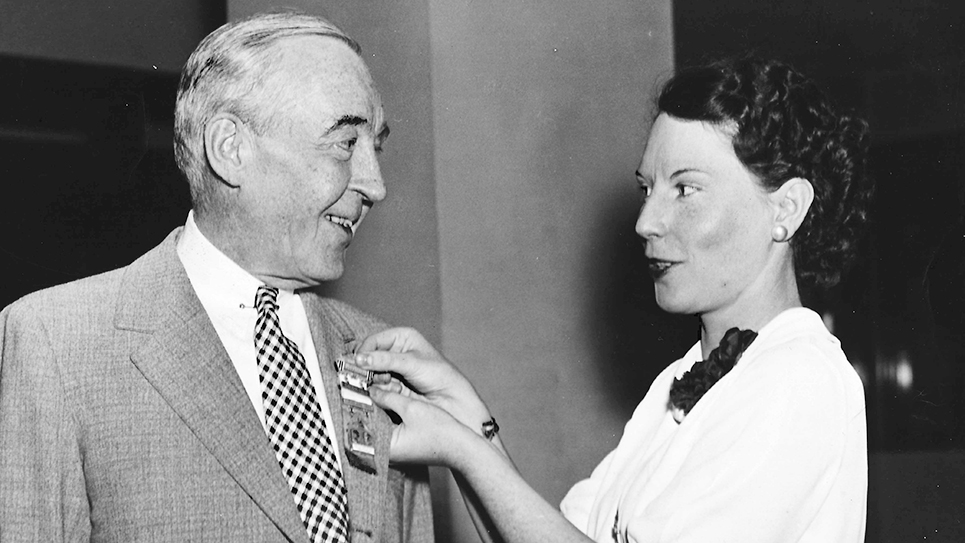The Gentleman From Kentucky
J. C. W. Beckham
By Ray Hill
John Crepps Wickliffe Beckham was the first U.S. senator to be popularly elected by the people of Kentucky. Beckham was the leader of a powerful wing of the Bluegrass State’s Democratic Party and was an imposing figure in its politics for decades.
J. C. W. Beckham was the scion of a well-known family that had been prominent in Kentucky’s politics for years. His mother’s father, Charles Wickliffe, had been governor of Kentucky and served very briefly as postmaster general under President John Tyler. If the young J. C. W. Beckham had aristocratic roots, the family did not have family money to go with the pedigree, as he was forced to drop out of school in order to support his mother, who had been widowed. A young man of ability and determination, within a relatively short time and before he was twenty years old, J. W. C. Beckham was a school principal. At the same time he was working, Beckham was attending the University of Kentucky and studying the law. Beckham earned a degree and began practicing law in Bardstown, Kentucky.
Beckham had earned his law degree in 1893, and as the following year was an election year, the young man took his first plunge into politics by running for Kentucky’s House of Representatives. It is remarkable to note that the 23-year-old Beckham was unopposed. Apparently, Beckham was a natural-born politician as he rose through the ranks of the House and served as speaker in 1898.
Kentucky has held its gubernatorial elections in the off-year and still does. William Goebel was the Democratic nominee for governor in 1899 and selected Beckham as his running mate. J. W. C. Beckham was not quite 30 years old when Goebel chose him to run for lieutenant governor. The gubernatorial race was hard fought and William Goebel lost to Republican candidate William S. Taylor, but the Democrats immediately challenged the results of the election. As expected, with the Democrats controlling both houses of Kentucky’s state legislature, it appeared they would overturn the verdict of the voters. Ironically, Goebel had been the author of an election law which created a three-man board of elections, all of whom were Democrats and friendly to the Democratic nominee. The Kentucky Board of Elections rendered a 2-1 decision saying the ballots under dispute in the 1899 election should be counted, a position diametrically opposed to that of virtually all Democrats seeking to void the election returns. Tempers flared and thousands of Kentuckians were incensed, and some historians have described the situation as being close to civil war inside the Bluegrass State.
The legislature was still arguing on January 30, 1900, when William Goebel was shot as he was walking into the Capitol Building. No one seems to know how many shots were fired; some estimate five or six, but one struck Goebel in the chest, mortally wounding him. The day after being shot, William Goebel took the oath of office as governor of Kentucky. Surrounded by no less than 18 doctors, Governor Goebel managed to sign only a single proclamation and died on February 3, 1900. J. C. W. Beckham assumed the office of governor following Goebel’s death.
To quell the chaos resulting from the controversy and the assassination of William Goebel, a special election was called to determine who would be the governor. J. C. W. Beckham beat the GOP candidate in the special election and by that time had turned 30, which was the required minimum age by the state constitution.
By state law, Kentucky’s governors at the time were not allowed to run for a second consecutive term. Governor Beckham filed to run once again in the 1903 election, and his right to run was immediately challenged in court. The ruling from the court affirmed Beckham’s right to be a candidate again, stating he had not served a full term in office after succeeding Goebel and was therefore eligible to run. Beckham was elected to a full term as governor in his own right by the people of Kentucky.
Consolidating his power as chief executive, J. C. W. Beckham stunned the political class when he sought to move the primaries for governor and the United States Senate well before the mandated dates. In the instance of the governorship, Beckham wanted the primary moved up a year and the senatorial election by two full years. It was a naked move to grab the senatorial nomination for himself while he still sat in the governor’s chair. Using the levers of power and patronage adroitly, Beckham also backed Samuel W. Hager for the gubernatorial nomination. With the full backing of the Beckham administration, Hager won. Governor Beckham also secured the Democratic nomination for the U.S. Senate for himself through a preferential primary held two years before the 1908 election. Kentucky Republicans put up former Governor William O. Bradley for the Senate seat, but Beckham’s heavy-handed tactics had alienated just enough fellow Democrats to make his election to the United States Senate impossible. Senators of the United States were still elected by state legislatures and were not legally bound by the results of Kentucky’s preferential primary. Sixty-nine votes were needed to win the Senate seat, and Governor Beckham peaked at 66. The balloting lasted weeks, and the governor could not get the 69 votes needed and William O. Bradley was close behind with 64 votes. Several Democrats pleaded with Governor Beckham to withdraw and let the party rally around another nominee, but he refused. Beckham’s stubbornness collapsed his candidacy on the 29th ballot when four Democratic legislators crossed over party lines to vote for former Governor William O. Bradley. Kentucky’s state legislature, with Democrats in the majority, had elected a Republican to the United States Senate.
Defeated for the United States Senate, J. C. W. Beckham resumed his law practice and waited for another opportunity. That opportunity came six years later. The passage of the Seventeenth Amendment to the Constitution of the United States removed the power of state legislatures to elect members of the U.S. Senate and called for direct election by the people. Kentuckians would go to the polls for the first time in 1914 and elect their own senator.
The former governor was hardly the only Democrat hankering to go to the United States Senate. Congressman Augustus O. Stanley, a 12-year veteran of the House of Representatives and a vocal opponent of prohibition, entered the primary, as did Governor James McCreary. Beckham won the Democratic nomination and the general election, defeating another former governor, GOP nominee August Willson.
During the senatorial campaign, Beckham had pledged to support another Wilson, President Woodrow Wilson. Beckham went to Washington and kept his word, remaining a firm supporter of the president and Wilson’s administration. It was during Beckham’s service in the Senate that the Eighteenth Amendment was added to the Constitution, making the sale of alcohol illegal in the United States. The adoption of the Eighteenth Amendment destroyed the various distilling and brewery business located in the Bluegrass State. Kentucky bourbon was famous, and it is said there were those who preferred it to Tennessee whisky, hard as that is to imagine. To the delight of fellow prohibitionists, women’s temperance leagues and many church-goers, saloons closed their doors and boarded up their windows.
Senator Beckham took a dim view of the Nineteenth Amendment to the Constitution, giving women the right to vote. The Kentuckian took the position that politics was too vulgar a thing for the womenfolk to participate in; to the contrary, it would be a travesty to expose women to the sordid doings of government and politics. Senator Beckham voted against the Nineteenth Amendment twice. It passed despite Beckham’s opposition and was ratified by the states.
Beckham had to face the voters again in 1920, and there were a goodly number of women, both Democrats and Republicans, who were not at all pleased that their senator had voted to deny them the right to vote. So, too, were the “wets” in Kentucky angry with the senator for his support of prohibition; Beckham lost the votes of those whose businesses had been shuttered or lost, as well as many of those who enjoyed a cold beer now and then. Another factor in the election was the American people having tired of Woodrow Wilson’s stubborn insistence that America join the League of Nations. The president, a bitter invalid locked inside the White House, had lost considerable popularity with the American people and had been rebuffed when he had called for the election of a Democratic Congress in the 1918 elections. Democratic presidential nominee James M. Cox pledged to bring the United States into the League of Nations while GOP nominee Warren G. Harding promised a return to “normalcy.” Harding won in a landslide and carried the Bluegrass State. Senator Beckham narrowly lost his Senate seat to Republican Richard Ernest, a 62-year-old attorney who practiced law in Cincinnati, Ohio, and lived in Covington, Kentucky.
Beckham sought to return to public office by running for governor once again in 1927. Democrats had lost statewide elections in 1920 and 1924, but the party had recouped Beckham’s seat in the Senate when Alben Barkley had defeated Senator Ernst. Beckham’s comeback campaign was significantly aided by the support he received from his friend Robert Bingham, who had purchased the Louisville Courier-Journal. Once again, Beckham faced yet another large obstacle in his political path through the opposition generated by the Jockey Club, a powerful combine of special interests who were hellbent on making parimutuel betting legal in Kentucky. The Jockey Club supported Beckham’s opponent in the primary unsuccessfully, then backed Republican nominee Flem Sampson in the general election. Governor William J. Fields, who had not supported Democratic U.S. Senator A. O. Stanley for reelection in 1924, once again bolted his party and refused to help Beckham against the Republicans. While the Democratic ticket swept every statewide race, J. C. W. Beckham lost the governorship to Flem Sampson.
Resuming his lucrative law practice, Beckham remained a power inside Kentucky’s Democratic Party, and every so often, the idea of trying to return to public office came to mind. Many political observers felt sure Beckham would run for governor in 1935, but the former senator was suffering from depression following the loss of a son. Beckham remained quite relevant to the politics of the time, offering his support to A. B. “Happy” Chandler, who was elected governor in 1935. Governor Chandler appointed the former senator to Kentucky’s Public Service Commission, but Beckham had a bigger goal in mind. J. C. W. Beckham was looking toward Senator Marvel M. Logan’s seat in the U.S. Senate.
The 67-year-old former senator entered the Democratic primary, but the senatorial campaign became a chaotic affair when Congressman John Y. Brown announced his own candidacy for Logan’s seat. Brown spent much of the campaign denouncing Governor Chandler as an “ingrate,” supposedly because the chief executive had earlier promised to support his senatorial candidacy if the congressman backed “Happy” for the governorship. Brown demanded that the governor meet him in a debate. Instead, Governor Chandler took to the stump to defend himself and hotly replied that John Y. Brown was the ingrate and ticked off every favor he had done for the congressman.
Congressman John Y. Brown was angry because Governor A. B. Chandler was openly backing J. C. W. Beckham in the Democratic primary. Chandler promised that if Kentucky Democrats would nominate Beckham, “together we will fulfill the destinies of Kentucky.”
Incumbent Marvel Logan merely campaigned hard and tried to wrap the mantle of President Roosevelt and the New Deal around himself as tightly as possible. That was enough for Senator Logan to eke out the narrowest of victories. Logan won 181,311 votes to 178,926 for Beckham, a difference of 2,385 ballots. John Y. Brown may well have kept Beckham from winning by siphoning off more than 85,000 votes.
John C. W. Beckham suffered a stroke in August 1939 that partially paralyzed him and he never recovered. The 71-year-old former governor and senator died at his home on January 9, 1940. © 2025 Ray Hill







